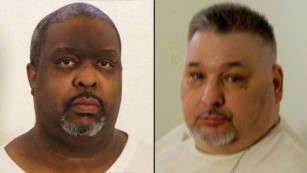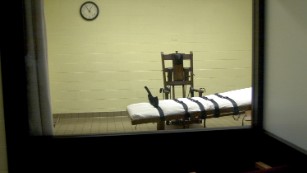An Oklahoma commission recommended a continuation of a moratorium on the death penalty in that state.
The Oklahoma Death Penalty Review Commission recommended the continuation of a moratorium on the death penalty "until significant reforms are accomplished," Brad Henry, commission co-chairman and former Oklahoma governor, said Tuesday. The current halt on executions was put in place in October 2015.
This is the overarching recommendation of more than 40 announced by the bipartisan group, which has spent more than a year and a half reviewing every part of the capital punishment process, from arrest to execution. The recommendations are detailed in a 294-page report published in an effort to "ensure a fair and impartial process."
The report addresses "systemic problems in key areas such as forensics, innocence protection, the execution process and the roles of the prosecution, the defense council, the jury and the judiciary," Henry said, adding that the commission members were "all disturbed by the volume and seriousness of the flaws involved in Oklahoma's capital punishment system."
That includes his belief "that it's very likely that at some point, Oklahoma has executed an innocent person. I don't know that to be true, and I don't think we'll ever know."
Commissioner Robert Alexander Jr., a trial lawyer, agreed, saying there are systemic flaws that could allow for it.
Alexander said he was shocked to learn that eyewitness identification and forensic procedures are not reliable, based on the facts uncovered by the commission's investigation.
"Two of the methods of conviction, or tools used in conviction that would intuitively be the most reliable, we found to be the most unreliable," Alexander said. The report recommends implementing forensic reforms that were adopted in 2013 but have not been put into practice. In addition, it calls for a strengthening of the qualification process for forensic experts.
'Most humane and effective method'
The commission also recommended the use of a single lethal barbituate protocol, rather than a combination of two or three drugs, saying this is the "most humane and effective method of execution possible." It did not identify which single drug should be used.
Although the report did not focus on a single execution, the review of the process began in the wake of the 2014 botched execution of Clayton Lockett. Having been sentenced to death for the 1999 shooting of Stephanie Nieman, Lockett was scheduled to die by a three-drug lethal injection cocktail on April 29, 2014, at the Oklahoma State Penitentiary in McAlester. Thirty-three minutes after the administration of the first drug began, the execution was halted.
"The doctor checked the IV and reported the blood vein had collapsed, and the drugs had either absorbed into tissue, leaked out or both," according to a previously released timeline. Lockett died of a heart attack 43 minutes after the execution began.
In calling for reforms to the system, Henry said that more resources are needed to make sure the decision to give someone the death penalty is truly fair and impartial. "If you want to do this, it must be done right. Here are ways to do this," he said, referring to the more than 40 recommendations.
The moratorium recommendation comes one day after Arkansas executed two men on the same night. That state's plans to execute eight death row inmates in 11 days using lethal injection have stirred debate over the death penalty.




No comments:
Post a Comment